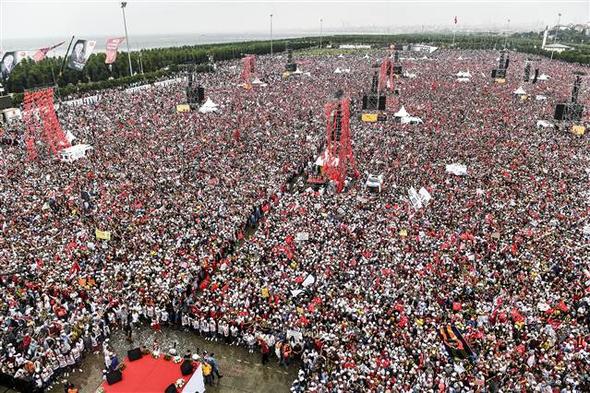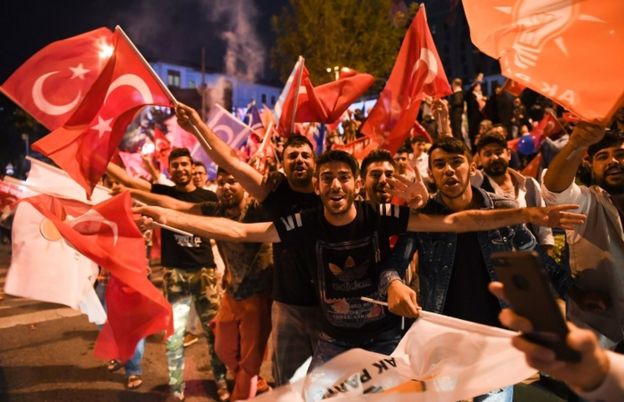For Critics, Erdogan’s Electoral Win Signifies a Regime Change in Turkey
For opponents from all political creed and social conviction, the nightmare came true on Sunday night. The presidential vote was a referendum on Recep Tayyip Erdogan‘s lifelong bid to establish an executive presidency. Last year’s referendum for a switch to the presidential system has now fully materialized.
On Monday, Turkey’s people woke up to a new day with a new system. “Turkey enters a new era, where its regime changed,” Journalist Yavuz Baydar wrote on Twitter.
With these results, no matter the background and methods, Turkey enters a new era, where its regime changed character. Some naivite of opposition creates now trauma. Unless it sees the big picture of shift to buying fascism and why, it is doomed to chase its tail.
— YavuzBaydar (@yavuzbaydar4) June 24, 2018
President Erdogan garnered 52.4 percent of the votes against his main contender Muharrem Ince who received 30.8 percent in the presidential vote. Although Erdogan was the favorite figure before the elections, a number of recent surveys suggested a possible runoff on July 8.
The result, therefore, came as a surprise to many observers.
“I think this was a surprise for everyone. Most of the analysts did not include, I think, the will of the electors for the stability and their fear to try something new while there are serious problems like the fluctuations in the economy and Syrian refugee mass in Turkey,” Gulcin Erdi Lelandais, director at CNRS at University of Tours in France, told Globe Post Turkey in an analysis of the election outcome.
“People know Erdogan and consider him as a tough guy and that is what he wants to give as an image. So all these factors permitted him to succeed more than his expectations,” she added.
In parliamentary elections, the opposition’s expectations for a majority tumbled. Erdogan’s ruling Justice and Development Party (AKP) lost the majority as a single party but its electoral alliance with Nationalist Movement Party (MHP) redressed its losses.
The “People’s (Cumhur) Alliance” won 53.5 percent of the votes while the “Nation Alliance” formed by four opposition parties were able to garner only 33.4 percent of the votes. The MHP emerged as the kingmaker in the election and altered the entire political complexion at the expense of the opposition.
The thrust of breakaway nationalist IYI (Good) Party onto the political stage had ominous repercussions for the political prospects of the MHP. It felt seriously threatened by Good Party and its charismatic and popular leader Meral Aksener who was one of the former denizens of the MHP.
Yet, the MHP defied all the forecasts, all the talk of doom and gloom for its future. Surveys showed it was well below the electoral threshold. Yet, it managed to get 11.5 percent of the votes, giving an edge to Erdogan’s AKP.
Turkey went to the polls amid a fluctuating economy, with lira losing 20 percent of its value against the U.S. dollar this year, a high burden of debt of the private sector to foreign banks, a ballooning current account deficit and pernicious effects of the emergency rule on freedoms and foreign investment.
President Erdogan aroused anxiety among international investors and bankers when he said during a televised interview with Bloomberg in London last month that he would intervene in Central Bank’s decision-making process to shape the monetary policy. It sent lira tumbling and led international credit rating agencies to decrease the rating of Turkey, certain banks and private firms.
Still, the opposition did not come up with a strong economic framework to deal with the woes and challenges lying ahead on the horizon. Despite stirring concerns abroad, Erdogan’s 16 years of experience in the charge of the country appeared to be a source of insurance for the majority of the voters.
“I believe that two factors played the crucial role: First, Erdogan’s charisma, his ability to speak with ordinary voters in an understandable language for them. Second, the widespread use of administrative resources by Erdogan,” Professor Ruben Safrastyan, Director of Institute of Oriental Studies at Yerevan State University, told Globe Post Turkey.
Did CHP Fail in Elections?

At one point, CHP’s presidential candidate Ince aroused newfound expectations for an upset triumph. He lured large crowds into his rallies, drew millions of people in Izmir and Istanbul. He reinvigorated a dispirited opposition and inflamed the hopes for a political change.
On Sunday night, there was a dead silence among CHP leadership after the YSK announced official results. It came after CHP spokesman Bulent Tezcan challenged the state-run Anadolu news agency’s figures. There was not a word neither from Ince nor other leaders for hours.
In a WhatsApp message sent to a journalist, Ince conceded the defeat. But the way he did stood in stark contrast to a figure something of a dedicated fighter he zealously displayed on the campaign trail. That did not sit well with loyal CHP base who just heeded the calls from party leadership and Ince himself to not to abandon ballot boxes till the morning.
A reckoning and self-evaluation first took place on social media. The reality slowly began to settle in on Monday. In a press conference held at noon, Ince accepted Erdogan’s victory and urged him to become the president of the whole nation.
“We will live the consequences of having one-man rule in the legislature, judiciary and government. I will keep up the fight as someone who got the approval of one person among every three in Turkey,” he said.
For Lelandais, Ince was really the best candidate and he did his best. He even managed a very offensive campaign against Erdogan and did not leave this last one to rule the game. He can be regarded as successful given the fact that he won 8 percent more votes than his party during the parliamentary elections.
Apart from the last vote, the main opposition party’s decades-long failure to expand its social reach has deep roots firmly entrenched in the socio-political culture and dynamics of Turkey, according to the expert.
She noted that the country generally has a right-wing, nationalist electorate. “The left is not powerful and often linked to the communism and to the period of the single-party regime where all resources are rare and production controlled by the State,” Lelandais said.
People, she argued, “have this prejudice … so they don’t generally vote for left-wing parties.”
To her credit, President Erdogan, during his campaign rallies, repeatedly invoked people’s bitter memories of economic hardships that dogged Turkey during center-left CHP governments. While Turkey’s economic crises had had multiple causes and were also linked with the worldwide trends either during the Second World War or the oil crisis during the 1970s, CHP administrations, in people’s collective memory, had a dismal record in terms of the management of the economy during those decades.
Safrastyan thinks that there are two main reasons for the CHP’s failure.
“First, the opposition, in particular, the CHP, for decades could not formulate any real alternative to economic and social policy of Erdogan,” he noted. “Second, the opposition, in particular, the CHP, for decades could not put forward from their ranks a charismatic leader.”
Election Legalizes De Facto Reality of One-Man Rule
According to Lelandais, the election result means the change of political regime, the end of the parliamentary regime. She said that the president will centralize a lot of power and there will be no more separation of powers. This, she emphasized, will be very dangerous and open the way to a totally authoritarian regime.
A CNN report portrayed Turkey as a country with “elected autocracy” where there are elections, but no longer core tenets of democracy.
Safrastyan believes that Turkey after these elections will move farther in restricting democratic freedoms and strengthen autocratic tendencies in the political system.
Regarding debates over the type of the new regime, he said: “I think, more relevant to the reality would be the following formulation: the legitimization of de facto one-man rule.”
The Sunday election has had reverberations across the outside world. While leaders of friendly countries wasted no time to shower praise for Turkey’s strongman, the E.U. refused to convey congratulations to Erdogan.
“As the election observation mission by OSCE/ODIHR assesses, the voters had a genuine choice, but the conditions for campaigning were not equal,” a joint statement on behalf of E.U.’s diplomatic chief Federica Mogherini and enlargement commissioner Johannes Hahn said.
German Chancellor Angela Merkel congratulated Erdogan for his victory and underlined that “Germany wants to be a partner of a stable and diverse Turkey, where democratic participation and protection of the rule of law are strengthened.”
“The last obstacle for the introduction of a highly undemocratic presidential system has now been removed. A system which is absolutely incompatible with EU accession talks,” E.U. Turkey rapporteur Kati Piri said on Twitter.
The last obstacle for the introduction of a highly undemocratic presidential system has now been removed. A system which is absolutely incompatible with EU accession talks.
— Kati Piri (@KatiPiri) June 24, 2018
The longstanding fear of an authoritarian regime in Turkey blessed by popular vote has become a full-fledged reality. Still, Lelandais preserves some form of hope after a strong and dedicated display by the opposition during the campaign period.
She said: “Turkish civil society find always channels to express itself, there are many people believing in democracy. We should not forget that the half of the population doesn’t want Erdogan and its party and Erdogan should deal with it.”
The expert added that Erdogan knows very well that the oppression could not endure in Turkey for a long time.




Comments are closed.